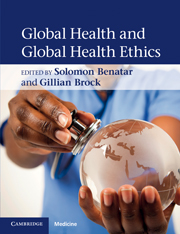Book contents
- Frontmatter
- Contents
- List of contributors
- Introduction
- Section 1 Global health, definitions and descriptions
- Section 2 Global health ethics, responsibilities and justice: some central issues
- Section 3 Analyzing some reasons for poor health
- 12 Trade and health: the ethics of global rights, regulation and redistribution
- 13 Debt, structural adjustment and health
- 14 The international arms trade and global health
- 15 Allocating resources in humanitarian medicine
- 16 International aid and global health
- 17 Climate change and health: risks and inequities
- 18 Animals, the environment and global health
- 19 The global crisis and global health
- Section 4 Shaping the future
- Index
- References
18 - Animals, the environment and global health
Published online by Cambridge University Press: 01 March 2011
- Frontmatter
- Contents
- List of contributors
- Introduction
- Section 1 Global health, definitions and descriptions
- Section 2 Global health ethics, responsibilities and justice: some central issues
- Section 3 Analyzing some reasons for poor health
- 12 Trade and health: the ethics of global rights, regulation and redistribution
- 13 Debt, structural adjustment and health
- 14 The international arms trade and global health
- 15 Allocating resources in humanitarian medicine
- 16 International aid and global health
- 17 Climate change and health: risks and inequities
- 18 Animals, the environment and global health
- 19 The global crisis and global health
- Section 4 Shaping the future
- Index
- References
Summary
Introduction
When people talk about global health, and the ethics thereof, they almost invariably mean global human health. This is not because it is impossible to have more expansive notions of global health that include other species. Instead it is because most people who are concerned about global health, like most of those who are concerned about local health, are either not concerned at all, or are much less concerned, with the health of other species. Thus global health ethics, although expanding the reach of health ethics geographically, has not extended moral concern to other species within that global space.
This is unfortunate for at least two reasons. First, there is good reason to think that not only humans but also some other animals, the sentient ones, are worthy of moral consideration. That is to say, they are the sorts of beings to which we have moral duties. I shall not argue for this conclusion here, in part because it has been defended extensively elsewhere, but also because overlooking animal welfare in the way that people generally do, poses a considerable threat to global human health. Thus, even those who fail to recognize the moral standing of non-human animals but do recognize the moral standing of humans should be more attentive to animal well-being on account of its instrumental value for human health.
- Type
- Chapter
- Information
- Global Health and Global Health Ethics , pp. 210 - 220Publisher: Cambridge University PressPrint publication year: 2011
References
- 5
- Cited by

